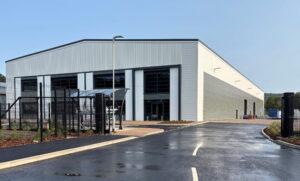Accelerate supports the development of safer VR experiences in Healthcare

UWTSD’s Assistive Technologies Innovation Centre (ATiC) and Cardiff University’s Clinical Innovation Accelerator (CIA) are collaborating with Rescape Innovation Ltd to improve the safe deployment of VR for health care staff and patients.
Rescape Innovation Ltd are pioneering the use of Virtual Reality (VR) in healthcare to reduce pain, anxiety and improve the patient journey. They have established a VR platform, called DR.VR™, that has been used successfully in the NHS, Care Homes and Hospices. The platform has also been successfully used to help reduce anxiety and stress in frontline care staff during the Covid-19 pandemic as well successfully training empathy and other emotional skills in blue light services.
With the emergence of Covid-19 the requirement for robust infection control protocols for the successful deployment of VR has become even more critical. Rescape has partnered with the team at Accelerate, specifically ATIC and CIA, to support Rescape in addressing their immediate challenge around infection control processes for safe deployment of VR and CE marking for DR.VRTM and also identify longer term RD&I challenges for the DR.VR TM platform and its effective deployment across a wider range of healthcare applications.
ATiC is working closely with Rescape, infection control nurse specialists and a group of NHS staff and carers who use DR.VRTM to understand and evaluate the way VR is currently being used with patients and staff across a range of clinical areas. Using a physical simulation of a real care environment constructed in their User Experience (UX) Lab in SA1 Swansea to address the current limitations in hospital and care home access, the ATiC research team are using a combination behavioural observation technology, including remote eye tracking, to evaluate the working approaches to safe deployment of the VR system in different healthcare scenarios.
User expertise, the type of patients, the physical environment, verbal and non-verbal communication and the design of the VR equipment itself all play a vital role in its effective deployment in healthcare settings. Using a combination of multi-camera audio/video recordings along with remote eye tracking and facial expression analysis available at their UX Lab, ATiC will be able to gain a better understanding of how staff and patients interact with each other and the system and capture important insights on how it’s safety and usability can be improved.
In parallel with this research work, Cardiff University’s Professor of Pharmaceutical Microbiology, Jean-Yves Maillard, will be advising on the effectiveness of current decontamination guidelines and how these can be improved. Professor Maillard and his team at the School of Pharmacy & Pharmaceutical Sciences will also be undertaking laboratory testing to establish the microbicidal efficacy of new guidelines and product / service enhancements to the DR.VRTM platform that will be developed by Rescape.
The aim is to use the research findings from the project to support Rescape’s development of the DR.VRTM system and new training and user guidelines for even safer deployment within healthcare scenarios as we continue to battle the longer-term impacts of the global Covid-19 pandemic.
The project is being led by Dr Sean Jenkins, Principal Innovation Fellow at ATiC, who is delighted to be collaborating with Cardiff University and Rescape as part of the Accelerate programme in Wales.
Dr Jenkins said:
“This is another excellent example of the collaborative potential for innovation between Welsh universities, NHS Wales, private sector care providers and the med-tech industry in Wales – exactly what the Accelerate programme was designed to do!”
“The project’s immediate short-term objective is to support Rescape through rapid applied research so they can develop new approaches to the safer deployment of VR in response to the challenges of Covid-19. The longer-term objective is to help Rescape expand a collaborative program of RD&I, at scale, to establish a body of evidence and use-cases that demonstrate applications and benefits of VR and inform the development and implementation of this technology in future healthcare.”
Matt Wordley CEO of Rescape Innovation said: “At Rescape in the last 18 months, we’ve shown that VR can have an enormous impact on improved healthcare in both clinical and non-clinical settings. This project with the teams at University of Wales Trinity Saint David and Cardiff University will help solve some of the challenges to enable the deployment of virtual reality at scale across both primary and secondary care.”
Sheridan Methuen, Head of Industry Engagement at Life Sciences Hub Wales, said: “It’s great to see that the collective resource and expertise provided through the Accelerate programme, is helping organisations like Rescape to positively reshape delivery of patient care in Wales. This fantastic project underpins the principle ethos of the Accelerate programme and highlights the power of collaboration.“
Professor Malliard from Cardiff University said, “I am delighted to have the opportunity to contribute to this collaborative project to ensure that the exciting deployment of VR in healthcare settings will be safe and successful.”
Accelerate is a pioneering collaboration between Welsh universities and Life Sciences Hub Wales. Funded by the European Regional Development Fund through the Welsh Government it helps translate innovative ideas into new technology, products and services for the health and social care sector, quickly. To find out more, visit: https://lshubwales.com/programmes/accelerate-programme





